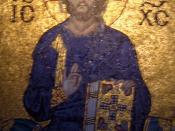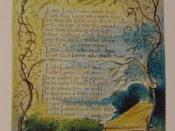William Blake's poem "The Lamb" metaphorically refers to Christ as the Lamb who came as a child, and that we are made in His image; this speaking of the religious importance and influences at the time this poem was written. It seams Blake's style of poetry proclaimed the supremacy of the imagination over the rationalism and materialism of the 18th?century.
William Blake is at first calling the lamb out as though it were an animal, "Little lamb, who made thee?...Gave thee clothing of delight, Dost thou know who made thee?" Blake is switching now in the latter half of his poem to the deity of Christ, "He is called by they name, For he calls himself a Lamb. He is meek and He is mild; He became a little child."
Many of Blake's spellings which seem odd or old-fashioned to us, must have struck his readers, also, as quaint.
Blake does not necessarily use metaphors, where something in the poem represents some other thing, usually an abstraction, in a one-to-one way. Rather he uses symbols and leaves it to the reader to decide what they mean. The picture of The Lamb's feeding "by the stream and o'er the mead" is a beautiful one, which suggests God's kindness in creation, and has an echo of similar descriptions in the Old Testament book of Psalms. In the second stanza, Blake reminds the lamb, and us, that the God who made the lamb, also is like the lamb. As well as becoming a child (like the speaker of the poem) Jesus became known as The Lamb of God. Jesus was crucified during the Feast of the Passover (celebrating the Jews' escape from Egypt) when lambs were slaughtered in the temple at Jerusalem. This was believed to take away the sins...


